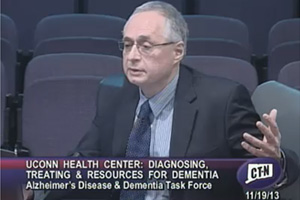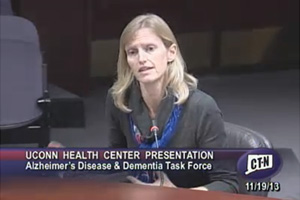
Experts from the UConn Center on Aging say shortages of health care providers, expertise and financial resources threaten Connecticut’s ability as a state to treat memory disorders in its elderly population.
“We currently have a state shortfall of 90 geriatricians as of today,” Dr. George Kuchel, director of the Center on Aging at the UConn Health Center, told a state Commission on Aging task force Tuesday. “But it’s not just geriatric medicine, it’s also nursing, social work, it’s all the other medical disciplines.”
Kuchel and colleagues Julie Robison and Vicky Aldridge were invited before the Task Force on Alzheimer’s Disease and Dementia to give a presentation on dementia, its treatments, and available community-based resources.
As of 2012, Connecticut’s 65-and-up population was more than 506, 000, with nearly 30 percent of that population considered “the most vulnerable,” Kuchel told the task force. And within the current and projected physician shortages is a shortage of expertise.
“Few primary care physicians have clinical skills in dementia care,” Kuchel said. “Few practice in multidisciplinary settings where they have access to other skilled professionals. Primary practice must be augmented to improve dementia care because there are so few multidisciplinary memory centers.”
Kuchel said Connecticut’s annual long-term care costs now exceed $2.5 billion and make up the single largest item in the state budget. One remedy to this is already underway: an effort to identify people who are in nursing homes but don’t need to be, and get them back into the community.

Robison, a geriatrics researcher in the UConn Center on Aging, leads a group that is evaluating a program known as “Money Follows the Person,” in which federal dollars help states ease the burden on nursing homes by rebalancing the load of patients in need of long-term care resources.
Robison also explained the latest projection of supply and demand of nursing home and community-based care.
“By 2025, in order to meet the projected need of people who are going to be receiving long-term support and services in the community, we’d need an additional 2,416 home health aides and an additional 1,294 personal care assistants,” Robison explained.
The Task Force on Alzheimer’s Disease and Dementia is charged with submitting a report on its findings and recommendations to the General Assembly’s Public Health and Aging committees by Jan. 1.
Video of the task force’s Nov. 19 meeting is available via the Connecticut Network at http://ct-n.com/ondemand.asp?ID=9631.
Follow the UConn Health Center on Facebook, Twitter and YouTube.



